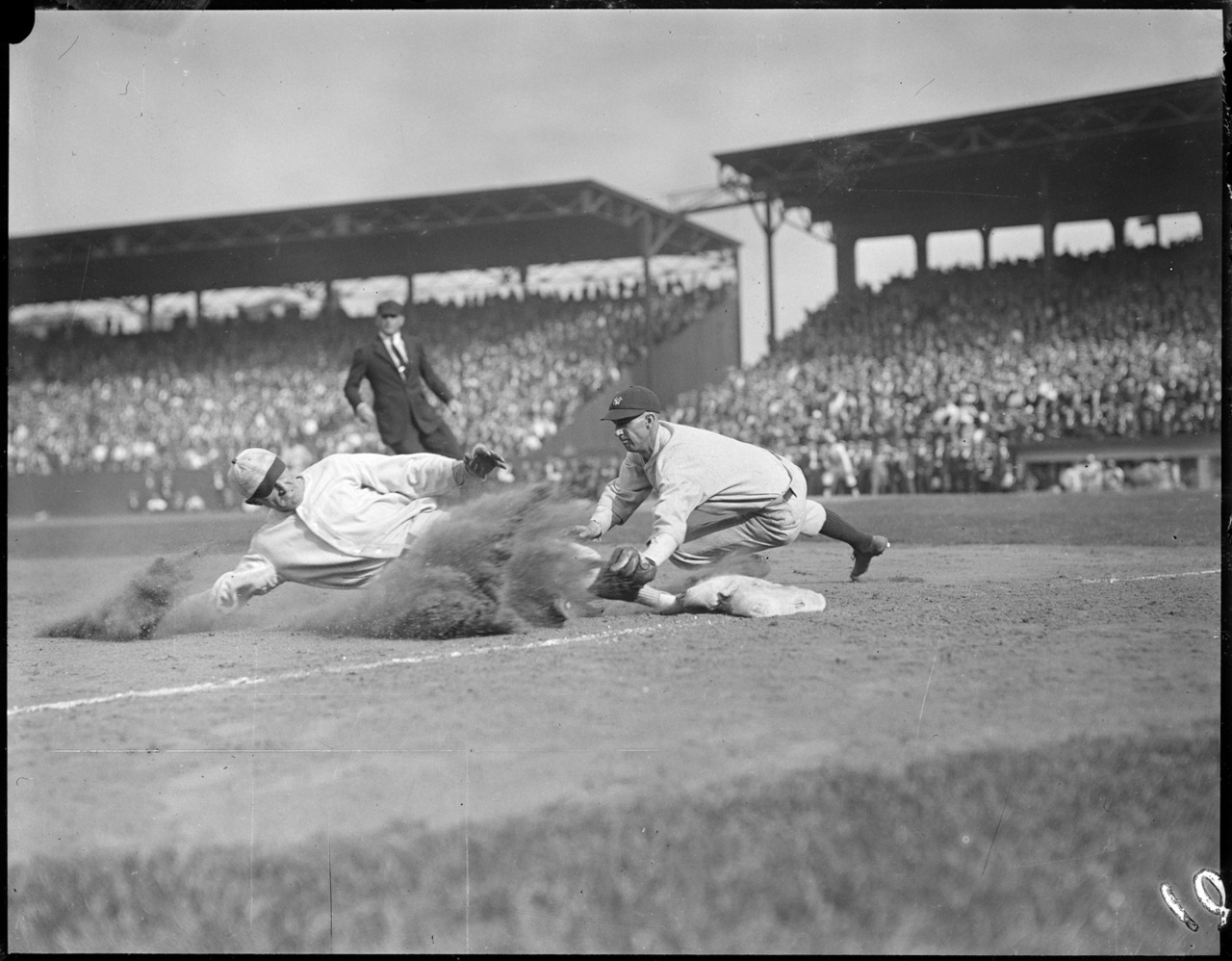
Yankees
Fenway Park, 1925

Fenway Park, circa 1925: a Red Sox base runner slides into third as Yankee Joe Dugan applies the tag. From a trove of amazing images from baseball’s golden age by Boston news photographer Leslie Jones. Until their recent publication, most of the images in Jones’s collection have never been available. The Boston Public Library will continue to upload images from the collection as they are digitized. Read more about the collection here.
Baseball’s Yankee Problem

It feels like spring in Boston this week (sunny, temps in the sixties), and the weather makes me anxious for baseball. We are several weeks into spring training, a strange limbo period when baseball is being played somewhere far off, with palm trees in the background, but it is just a rumor around here.
This season feels different, though. I am not looking forward to Opening Day the way I used to. Maybe it is just that I am getting older. It is hard to take sports as seriously as I did when I was a kid. A bunch of guys run around with “Boston” or “New York” or “Cleveland” on their shirts — so what?
Also, to a lifelong Red Sox fan, 2004 changed everything. Winning is less urgent now. Losing does not seem to reflect on us personally anymore. Baseball, it turns out, is just a game after all. (If that sounds ridiculous to you, you did not grow up a Red Sox fan.)
But the real disenchantment, I think, came with last year’s Yankee blitzkrieg, culminating in a World Series that felt like a sham, the result seemed so inevitable. The entire playoff tournament was more kabuki theater than baseball: we had to go through the ritual of actually playing out the games before inevitably handing the trophy to the Yankees, but the outcome was never in doubt.
Of course none of this is new. The Yankee dynasties have always been powered by the economic engine of New York City. The team has always spent big and stockpiled star players (except for a hiatus in the 1960s). But for the last decade baseball fans — Yankee fans and Yankee haters alike — were lulled into believing that, whatever advantage the Yankees’ payroll gave them, the playoffs were chancy enough that we could still consider the whole thing … well, not fair, exactly, but fair enough.
The 2009 Yankees ended that little dream. The team was the apotheosis of checkbook baseball. Before the season the Yankees spent over $400 million on three star players — Mark Teixeira (8 years, $180 million), C.C. Sabathia (7/$161), and A.J. Burnett (5/$82.5). Their payroll exceeded $206 million in a year when no other team spent more than $140 million. And then, after a bumpy start to the season, they simply overwhelmed the rest of the league. It was all just so predictable and obvious. Money, winning; cause, effect.
I don’t mean to turn this into an anti-Yankee screed. There is enough of that out there. (Joe Posnanski’s recent rant is a triumph of the form.) My complaint is not with the Yankees, anyway. As their fans correctly point out, they are playing within the rules. They are supposed to do everything they can to win.
Also, let’s be clear: the lack of competitive balance in MLB is also a “Red Sox problem,” and a “Tigers problem” and a “Mets problem.” High payrolls correlate with wins, so all high-payroll teams have an advantage over lower-payroll ones. But no team benefits more than the Yankees for the simple reason that they have the highest payroll by a very wide margin.
No one seriously argues anymore that the system is not unfair. “You can’t buy a World Series, otherwise the Yankees would win every year, which they don’t.” “Look at the small-market teams who have succeeded, like the Rays in 2008.” “Look at how many different teams have won titles over the last ten years, doesn’t that prove the league is balanced?” After last season, you don’t hear these things much. No, you can’t guarantee the result of a baseball season. But to suggest that gathering so many of the best players on one team does not affect the odds is ridiculous.
So Yankee fans (and Red Sox fans, too) make a different argument: the system is unfair, but the inequality is justified. Or perhaps it is more accurate to say, the system distributes players unequally but not unfairly. The Yankees actually deserve an advantage.
Arguments favoring the current unbalanced system generally come in three flavors:
- Render unto Caesar: “The reason the Yankees can spend so much money is because they bring in so much money, which comes directly from [the fans’] pockets. We support and finance our team better than anyone else, so we deserve the best players more than anyone else.”
- Blame the victim: The futility of small-market teams is their own fault. All of them could spend more to compete but they choose not to, opting to pocket their profits rather than reinvest in the team. Some small-market teams are badly managed, as well, unable to outfox the big-market clubs with clever moneyball strategies.
- Distributive justice, or “a rising tide lifts all boats”: The Yankee imperium is actually good for everyone because a glamorous team attracts TV ratings and big crowds when they visit small-market parks. Plus, some of the Yankees’ haul is redistributed to the needy via the luxury tax, so everybody wins. Except in the sense of actually, you know, winning.
There is a grain of truth to all these arguments, sometimes more than a grain. At the same time, they all feel lawyerly and dishonest. Once you concede that the system is unfair, the rest is details — excuse-making, special pleading.
All of this has been argued to death and, honestly, none of it reaches the real problem.
The real problem with the Yankees’ dominance is that it is utterly repetitive and predictable. It fails as drama. It is a dull story that we’ve heard a thousand times (well, 27). Pro sports, famously, is entertainment, and baseball has become the one thing that entertainment must never be: boring. I am not disgusted with baseball; I’m bored with it. It is a movie I’ve already seen.
Yankee fans have an answer to this complaint, too. The Yankee empire creates a ready-made storyline for every season: who will play David to the Yankees’ Goliath? That was the story that drove the Yankees-Red Sox rivalry for decades, and it is the default story sportswriters have told every year for the last decade when the Yankees lost.
The trouble is that the Yankees’ payroll has grown so enormous and their advantage so overwhelming that nobody really imagines the next decade will play out like the last one. In terms of resources, the Yankees have pulled away from the pack. The team is now so stacked and their spending power in the new stadium so outlandish that, looking forward, it is impossible to maintain even the pretense of competitiveness. Yes, the Yankees may lose some years — hey, you never know. But their advantage has never been greater, and over the course of a long season, even more so over a decade of seasons, that advantage figures to make baseball more and more predictable.
Maybe I’m wrong. Maybe this is all too gloomy, an overreaction to one lopsided World Series. Maybe, too, what I’m feeling is the usual Yankee Derangement Syndrome of a pre-’04 Red Sox fan. But I don’t see anything closing the payroll gap between the Yankees and everyone else in the near future. To me, the next few summers look like an endless loop of the 2009 season.
I don’t know much about baseball, but I do understand storytelling, and I can tell you that this plot has none of the elements of a good story. No character arc, no change, no movement, no personal metamorphosis from one thing to another. No redemption or triumph over adversity. Nothing really for the Yankees to overcome because the dice are loaded in their favor to begin with. (For the Yankees, the drama is all off the field: A-Rod and Madonna! A-Rod feuds with Jeter! A-Rod used steroids!) No adventure, no suspense, no dramatic tension. No situation, complication, climax, no afterglow of denouement. No Campbell mono-myth, no Shakespearian five acts, no Freytag triangle. A few surprises along the way, perhaps, but looking forward the surprises are likely to grow fewer and further between. Just a relentless, remorseless, repetitive playing-out of the inevitable.
Maybe that is a story Yankee fans will want to sit through again and again. For the rest of us, not so much. In the big picture, the real rival for the Yankees is not the Red Sox. It is the movies and cable TV and Wii and all the rest. The unique appeal of sports among all its rival forms of entertainment is that it is unscripted and therefore unpredictable. The NFL seems to understand that, and therefore has made a fetish of “parity.” Baseball has never bothered with competitive balance, which was fine as long as the rich and poor teams remained within shouting distance. Now, we are likely to see the same show over and over for the next few years. How long before people get bored and change the channel? Personally, I already have my finger on the clicker.
Photo: Life Magazine